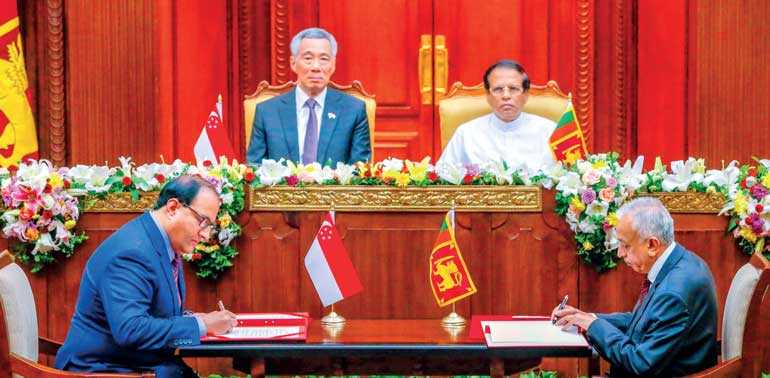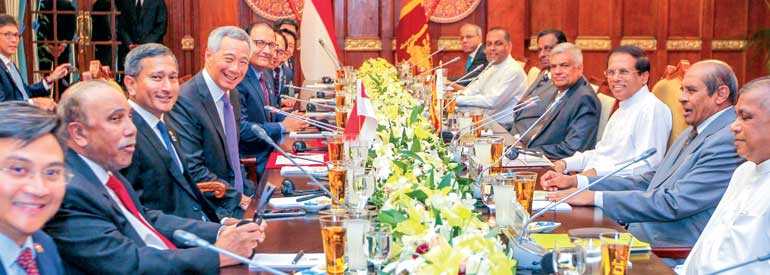Tuesday Feb 17, 2026
Tuesday Feb 17, 2026
Monday, 6 August 2018 00:00 - - {{hitsCtrl.values.hits}}

By Nalaka Jayaweera
The article published in the Daily FT on 2 August on ‘Understanding Sri Lanka-Singapore FTA’ by Ganeshan Wignaraja and Amitendu Pali is, I believe, misleading and misinforming the facts of the SLSFTA. As a result, the readers have the right to know the actual facts and truth of the SLSFTA, at least in narrative format.
This analysis has been done on 1,082 pages of SLSFTA, which is only a part of the full document. The other documents, which are a part of SLSFTA, have not been released to date and I am awaiting the remaining documents through the Right to Information Commission (RTIC), which may lead to much more comprehensive analyses and arguments.
Simply put, any human reserves the right to dream in their own manner. Theories or dreams can be like ‘Sri Lanka is a desert and can be developed like the UAE’, or ‘Sri Lanka is an autocratic system like Singapore and so, can be developed like Singapore’, and keep on arguing for years or decades or even centuries. In normal society, we refer to these as ‘cults’, and it is no doubt people with irrational minds who can dream with such passion and in such fashion. But the reality is too hard and Sri Lankan politicians and bureaucrats have failed to grasp the essence to see a future of Sri Lanka. This failure is mainly due to so-called economists who have failed to develop the systems of this country as they have failed to note or intentionally ignored the changes in the world while being associated with the economic and trade decision-making procedures.
The article on understanding the SLSFTA is nothing but an attempt to preach theories that are least prioritised concepts that no longer exist in ‘real trade’. The world trade or, as they claim, economics shifted from theories of factors of production, market, comparative advantage and economies of scale a long time ago, and the article directly and, or indirectly, attempted to preach such outdated and outcast theories.
It is no doubt that the present day ‘international trade’ is legal systems and legal infrastructure inclusive but not limited to national registration procedures and mechanisms, standardisation authorities, procedures and mechanism, and many other legal institutionalisations and frameworks. Therefore it is no doubt the Sri Lankan ‘economists’ have an inherent weakness in understanding the ‘trade’, and it is due to the fact that all what is being discussed is not a single theory approach but multidisciplinary approaches with complex legal systems, where economists are weak as per present experience.
Singapore, with one of the most advanced legal systems in the world that is being updated almost on an annual basis, is looking for a ‘deal’ with Sri Lanka, where the legal system is older by decades, apart from not having any legal system that is geared for international trade. The article has tremendously failed to evaluate at least the two legal systems of SLSFTA or, that is, Sri Lanka and Singapore, and the writers have failed to identify the differences in the two legal systems while they are dreaming of acquiring the world through SLSFTA. It is definitely the democratic right vested in them to dream in their own ‘shells’.
The ‘naked reality’ is that the MODSIT (Ministry of Development Strategies and International Trade) does not have any detailed document of the legal systems in Singapore and its applicability to the different service sectors apart from non-availability of a detail analysis of the other agreements signed by Singapore, and thereby, the possible markets for Sri Lankans through such agreements, whereas analysis of the legal systems of many other countries is crucial.
In order to give an insight of the Singaporean legal system, it is vital to look into Singaporean commitments in the SLSFTA in comparison to Sri Lanka. The profession of legal advisory services has been liberalised by Sri Lanka as well as Singapore. The Sri Lankan commitments state:
Legal Advisory services in International or any home country law excluding Sri Lankan Law (CPC 8611**, CPC 8612**)
And Market Access states as follows where (1) Cross Borer (2) Consumption Aboard (3) Commercial Presence (4) Presence of Natural Persons:
(1) None
(2) None
(3) Unbound
(4) Unbound
In order to understand the CPC 8611 and CPC 8612, the Central Product Classification 1991 (Provisional) states:
8611 Legal advisory and representation services in the different fields of law
86111 Legal advisory and representation services concerning criminal law
Legal advisory and representation services during the litigation process, and drafting services of legal documentation in relation to criminal law. Generally, this implies the defence of a client in front of a judicial body in a case of criminal offence. However, it can also consist of acting as a prosecutor in a case of criminal offence when private legal practitioners are hired on a fee basis by the government. Included are both the pleading of a case in court and out-of-court legal work. The latter comprises research and other work for the preparation of a criminal case (e.g. researching legal documentation, interviewing witnesses, reviewing police and other reports), and the execution of post-litigation work, in relation to criminal law.
86119 Legal advisory and representation services in judicial procedures concerning other fields of law
Legal advisory and representation services during the litigation process, and drafting services of legal documentation in relation to law other than criminal law. Representation services generally consist of either acting as a prosecutor on behalf of the client, or defending the client from a prosecution. Included are both the pleading of a case in court, and out-of-court legal work. The latter comprises research and other work for the preparation of a case (e.g. researching legal documentation, interviewing witnesses, reviewing police and other reports), and the execution of post-litigation work, in relation to law other than criminal law.
8612 86120 Legal advisory and representation services in statutory procedures of quasi-judicial tribunals, boards, etc.
Legal advisory and representation services during the litigation process, and drafting services of legal documentation in relation to statutory procedures. Generally, this implies the representation of a client in front of a statutory body (e.g. an administrative tribunal). Included are both the pleading of a case in front of authorised bodies other than judicial courts, and the related legal work. The latter comprises research and other work for the preparation of a non-judicial case (e.g. researching legal documentation, interviewing witnesses, reviewing reports), and the execution of post-litigation work.
Interestingly, the relationship of 8611 and 8612 to international law cannot be found, except it details normal civil and criminal law aspects and back office operations. When the mode 1 and 2 is open (“None”) any person as per SLSFTA can supply the said services via internet or while being in Sri Lanka.
But the manner Singapore has liberalised the similar sector is as follows:
Legal advisory services in any home country law, foreign law and/or international law (excluding any direct or indirect practice of Singapore law as the domestic law (host country law))
And Market Access states as follows where (1) Cross Borer (2) Consumption Aboard (3) Commercial Presence (4) Presence of Natural Persons:
1) Unbound
2) None
3) Individual law firms of Sri Lanka which are or have been duly constituted under the laws of their respective home countries will be permitted to register as foreign law firms under the Legal Profession Act (Cap. 161) and the rules made thereunder in order to provide legal advisory services in Singapore in any home country law, foreign law and/or international law in which they are qualified to practise (but excluding any direct or indirect practice of Singapore law as the domestic law (host country law)
4) Unbound except as indicated in the horizontal section
While emphasising the fact that Singapore does not refer CPC classification, it is not worthwhile to elaborate the Cap 161 of Singapore as it is a detailed document with clear-cut definitions and procedures.
The aforesaid comparison will indicate the depth of legal systems in Singapore when Sri Lanka states “None” for Mode (1), Singapore States ‘Unbound’. Sri Lanka refers CPC 8611 and CPC 8612 where it does not specify anything international, and Singapore refers Cap 161 clearly with clear definition, interpretations, processes and procedures for international lawyers and their registrations. Further, Mode 3 of Singapore clearly defines the legal provisions where Sri Lanka lacks any such legal systems.
The theory of free trade for FDI has been argued by the writers, but there is no such co-relationship of FDI to FTA. A politically strong government with a definite set of principles, rules, and laws can attract many FDIs than FTAs. FDI being ‘not grants’, the manner to pay back FDI without earing foreign currency has not been divulged by the writers. This does not mean FDI is not necessary to a country, but it should be as per the ‘master plan’ of the country to develop from the ‘present to future’ where Sri Lanka has not done any such detailed study to date like the Indian Trade Policy 2015 - 2020.
Apart from the outdated theoretical arguments by the writers, they are stating facts that are absolutely wrong as per the SLSFTA clauses. The article states:
“However, the SLSFTA only provides for controlled entry of a few foreign managers and technical manpower per project which usually accompany FDI internationally.”
THE SLSFTA clearly liberalises under Mode 3 (legal persons) the sectors of CPC 87201, CPC 87202, CPC 872014 and CPC 87205 or manpower supply companies. The said liberalisation has no quotas or any other pre-qualifications except it states that as per the Horizontal Commitments. The Horizontal Commitments of Mode 3 ‘Market Access’ states as follows and no other condition attached to the same.
3. Service Supply through commercial presence must be after registration under relevant Sri Lankan laws.
Therefore the writers’ argument is false, misleading and misinforming the public and it seems to be an intentional lie as they cannot claim that they were unaware of the clauses in the SLSFTA. This is worse as Sri Lanka does not have any standards in terms of managers or technical staff apart from any national registration for vocations and professionals, which means clear access for anyone to come to work in Sri Lanka. As Mode 3, or ‘legal persons’, has been interpreted in a very loose manner which includes any company registered in Singapore inclusive of foreign-owned companies and even offshore companies of Singapore, the liberalisation of manpower companies moves to other countries through Singapore as well. But let us accept the fact that it is the democratic right vested in writers to dream the way they prefer, but that it is not the reality.
Any party can evaluate the SLSFTA in isolation like the writers have done and so, it can be interpreted in many ways, but the reality is far from what the article claims and the truth is bitter.
It is an open invitation to writers as well as all other SLSFTA sympathisers to come for a public debate on the SLSFTA as these paper articles are not sufficient to explain it all.
Last but not least, please note that this is not to state or propagate that we are against liberalisation, but what we are working towards is to have an equal status quo for all.
The writer is an International Trade Activist
